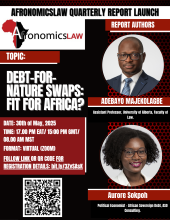The African Sovereign Debt Justice Network, (AfSDJN), is a coalition of citizens, scholars, civil society actors and church groups committed to exposing the adverse impact of unsustainable levels of African sovereign debt on the lives of ordinary citizens.
Convened by Afronomicslaw.org with the support of Open Society for Southern Africa, (OSISA), the AfSDJN's activities are tailored around addressing the threats that sovereign debt poses for economic development, social cohesion and human rights in Africa. It advocates for debt cancellation, rescheduling and restructuring as well as increasing the accountability and responsibility of lenders and African governments about how sovereign debt is procured, spent and repaid.
Focusing in particular on Kenya, Zambia, Zimbabwe, Mozambique, Nigeria and Senegal, the AfSDJN will also amplify African voices and decolonize narratives on African sovereign debt . Its activities include producing research outputs to enhance the network’s advocacy interventions. It also seeks to create awareness on and elevate the priority given to sovereign debt and other economic justice issues on the African continent and beyond throughout 2021.
